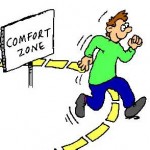I wrote a blog post last week about letting go (http://www.mclarencoaching.com/let-something-go/). The week before I wrote a blog about giving it everything you’ve got – don’t give up even when you feel you cannot go any farther (http://www.mclarencoaching.com/how-far-can-you-go/). What has arisen from the feedback is this – how do you know when it’s time to press harder and when it’s time to release?
I’d love to hear your thoughts on this. These are mine:
1. Decide from values. I am teaching a class on values right now. Values are guiding principles that will support you in making the most important decisions. If you have an employee who is not working out, do you spend more energy on that person or cut them loose? The answer may be found by looking at your company/firm’s values. If we value integrity, collaboration and respect and this person does not demonstrate any of these values, maybe he is not a fit for us. Or, if we value integrity, collaboration and respect and this employee demonstrates two of the three, perhaps we can train him to the third.
2. Check your comfort zone. The answer often in let go versus press harder (and the answer to many questions indeed) is do that thing you do not want to do. Do the thing that is outside of how you habitually respond. Personally, my tendency is to hold onto things that I love but are no longer serving me. Or to hold onto things that used to work but are no longer appropriate. I had a way of managing my contacts when I was a young and small business. After my business grew quickly one year, I had a consultant say to me you need to manage your contacts in a more comprehensive database. This had always seemed like so much work to me but I came to realize I needed to step into the next level of my business and that my business really could not grow much more if I was not willing to take this next step. I had to let go of my old start-up-company way of managing my contacts. I knew I had to because I know myself well enough to look for that tendency to hold onto something I think is working that I have in fact outgrown. It scared me so I did it.
3. Be “all in” before you let go. Many people give up easily. It’s a fact that is useful to know especially if this is something you do. It is a comfort zone. When we look at letting go versus giving it everything you have, these are not two ends of a spectrum. We must let go to grow. We must also put everything we have into the most important things. I want to make a clear distinction between holding on and putting everything you have into what you want. Once it’s time to release something, the time to give it your all has passed. A third way to know it’s time to let go is after you have put everything you have into it. Let’s go back to that employee whom you are unsure if you should keep. If you make a real effort to see what can be done to bring him on board and it doesn’t work, you can let go. If you phone it in and complain about him and meet with him periodically to offer vague half-hearted feedback it will be harder to know when to let go. Once you’ve gone all in on something and it doesn’t work, then you know you can let go.
4. Balance your energies. You cannot put your full effort into everything. You will have to choose. You can choose from values. You can choose from purpose. You can choose from what is most important given the outcomes you have declared for your year or this month or this day. Let go of what does not serve you. And when you decide what you really want, be all in. The only way to have the energy to be all in is to let go of what you do not need. Decide what the most important things are and go all in. After becoming trained as a coach, I considered staying in my law practice as my “day job” to transition into coaching. I realized this was splitting my energy. I felt pulled between the two careers. I was trying to hold onto law when I really wanted coaching. I was not fully committed to the coaching practice. It was scary to let go of the thing that gave me security, but I realized I could not become successful in my coaching practice unless I brought everything I had to it. So I did.
5. You know. At the end of the day, you will know. Trust yourself.







